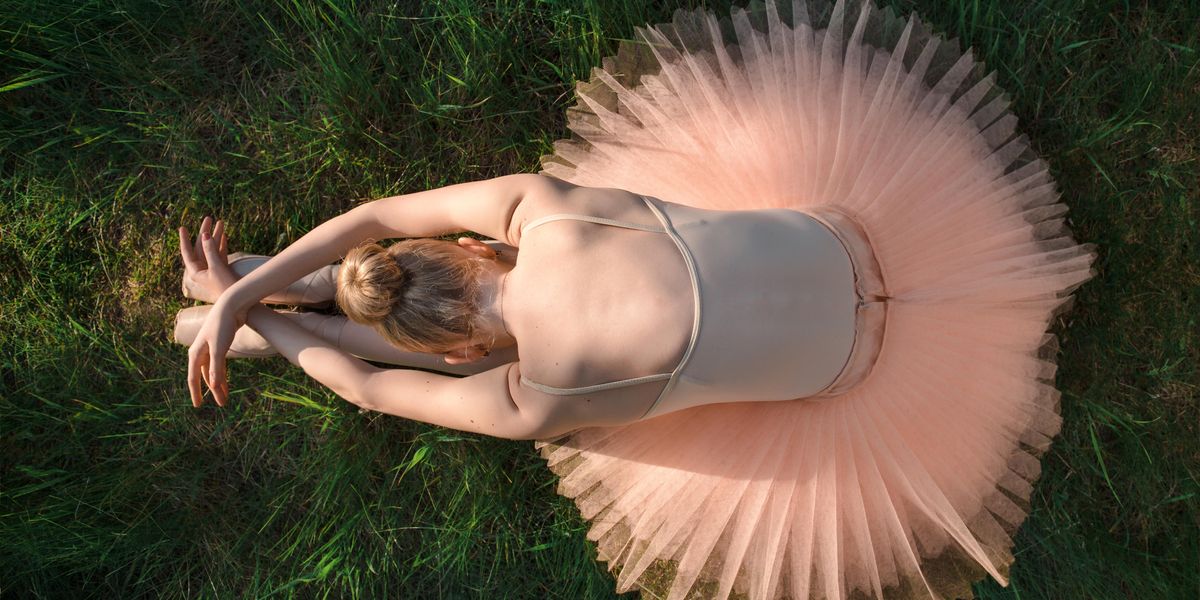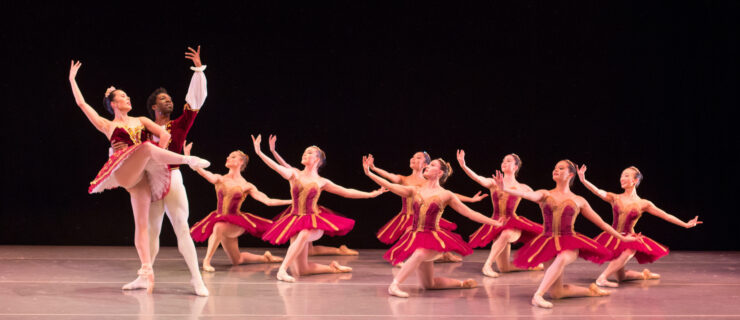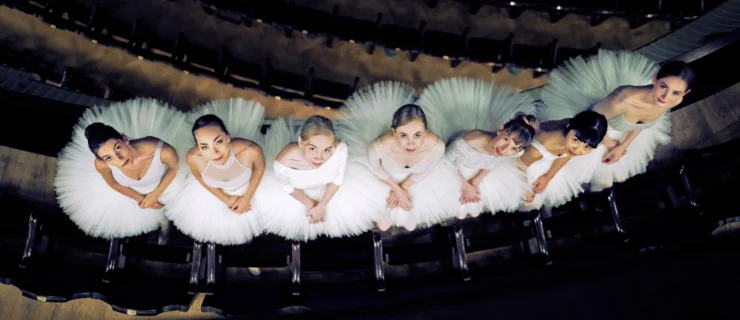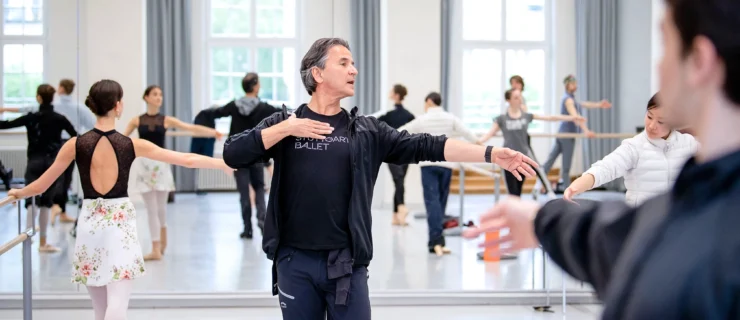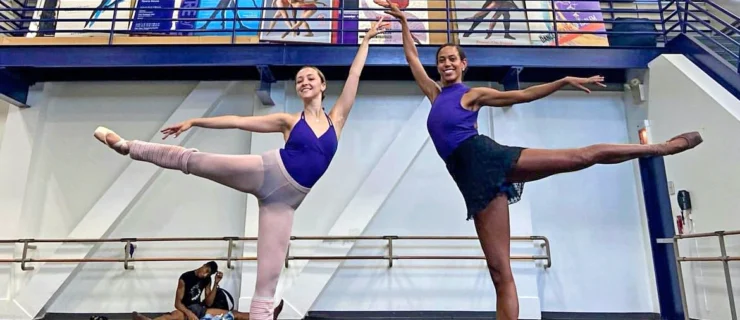The Turning Point
As told to Amy Brandt
Many pre-professional dancers think attending college after high school is unnecessary—that it wastes precious professional years. But between the intense training schedules, choreographic opportunities and academic offerings, college dance programs can actually be springboards to a future career. Some dancers choose college to further their training, while others crave the intellectual challenges. Along the way, their experiences may help strengthen their goals, open new doors or change the direction of their careers. Pointe spoke with six dance majors about their individual paths and moments of discovery during their college experience.
Nasira Burkholder
Senior, University of Arizona
My parents pushed me to pursue a college degree. I was devastated, because I was in the professional division at the Pacific Northwest Ballet School and college was not part of my plan. I expected ballet would become a secondary part of my life, but during my freshman year I was taking two ballet classes a day and a jazz class, then rehearsing all night. It’s like being in a professional company—we do about 60 performances a season. I also didn’t expect to take such a strong interest in academics, but I decided to double-major in nutritional sciences. It’s not easy balancing 25 units a semester, but I don’t regret it.
I’ll never forget my first ballet class here. I felt really challenged and saw several dancers who were going to push me to improve. Seeing the competition made me realize what I was getting into and I thought, “Wow.” I called my parents that night and thanked them for forcing me to give it a chance.
Jordanne Lackmann
Senior, University of Utah
I didn’t start focusing on ballet until high school, so I wasn’t ready to audition for companies. I chose the U because they have a specific ballet degree, and I hoped to get better training. I’m in the highest level, called Utah Ballet, which is the resident ballet company. I’m also in a character company. We get to travel—we went to Russia for a character workshop and to Spain to learn Basque dancing.
During my time here my technique and pointework have gotten stronger and my ideas of ballet have expanded. I’ve learned about dance history and teaching philosophies. I’ve also learned not to look at a professional career as unattainable. With hard work you can achieve anything, no matter where you trained.
Kathleen Martin
Sophomore, Point Park University
I auditioned for companies and was offered an unpaid position, but I chose school because I wanted a more secure environment. Because the dance program is so intense, I wasn’t sure if it would allow time for a social life. But I have both an active social life and a dedicated dance life. Most kids at Point Park are dancers, singers or acting majors, so we all get it. Sometimes it’s hard when friends are out partying and you have to focus on your diet and getting enough rest. But it’s worth it to me.
The faculty here is very diverse, so you get different perspectives on dance and how to go about your career. And the department teaches a variety of techniques. My goal now is to dance with a ballet company that also does contemporary works.
Colleen Barnes
Senior, University of Cincinnati, College-Conservatory of Music
I wanted a more thorough, intellectual exploration of dance. That meant going to college, because you discuss dance, take dance history and learn about all the things related to it—you can really explore it. I didn’t realize how much I’d learn and how the
quality of my movement would improve.
CCM provides so many opportunities that I didn’t expect. I’m spending the fall semester teaching in southeast China. What a great learning experience! Others have accepted traineeships with Cincinnati Ballet and Louisville Ballet and take correspondence classes. CCM is flexible about helping you work towards a degree.
I’ve had so many lightbulb moments of “Oh, I never thought of it that way.” My biggest epiphany was realizing that dance is connected to everything; it’s the root of human experience.
Ben Delony
Senior, Indiana University
I chose college because I wasn’t ready to audition and wanted four more years of solid training. IU’s ballet department has definitely delivered. There’s a great sense of discipline and ensemble, and we have to work for roles. We’re at the studio all afternoon, so balancing homework with classes and getting enough sleep has been interesting. The structure reflects our progress—the teachers e-mail our schedules to us the night before—so we’re always on our toes.
During my sophomore year I realized I don’t really have a ballet body—I’m 5’8”, without any hyperextension and don’t seem to match the other men in the program. I decided to find another avenue of dance. Last year when I did a huge independent collaboration with an IU cellist, it turned me on to more avant-garde styles of dance. It was disappointing to realize you have to fit a mold in classical ballet, that it can’t be all heart. But I got over it when I realized that dance has many roads to choose from.
Gabrielle Salvatto
Junior, The Juilliard School
Although I’d gone to the School of American Ballet for nine years, I wanted to become more versatile rather than a strict ballet dancer. Juilliard’s hype definitely intimidated me, but it’s not really a typical college experience. People aren’t partying all the time because they can’t ruin their vocal chords, or they have to get up early to stretch. Everyone has the same goals, so the environment is a lot friendlier.
A big turning point for me was working with Ohad Naharin. I expected him to be intimidating, but he was really inspiring. He promotes individuality among dancers, and most of what we worked on was our own improvisation. He’d smile and say, “That’s great! Work on that for another eight counts.” He opened my eyes to the dance world outside what I’d known before.
Dance Or Study?
By Gwynedd Vetter-Drusch
For some dancers, a professional career is a clearly defined dream. But not every dancer follows a direct path to the corps; for some, the way is a winding road of second guesses and outside interests.
I fell in love with ballet at a small summer intensive in West Virginia when I was 13. But as I grew more dedicated to my training over the next few years, I questioned whether I wanted or could have a career. Because of my late start, I was filled with doubt about my ability to catch up. Furthermore, I had a hungering interest in academics—an area in which I felt far more confident—and I knew that I wanted to study writing and international relations.
So, I kept my options open. I graduated high school at 17, giving myself a “gap year.” However, when I received a generous scholarship to my college of choice, Bard College, suddenly my decision became very real—and very difficult.
While my parents expect me to one day hold an advanced degree, they believe that the life lessons I can learn from ballet will only better prepare me for college. For myself, I’ve felt that I should pursue ballet until this path ends, or I’m ready to turn my focus elsewhere. After considerable thought, I deferred enrollment for a year to study at the Ellison Ballet Professional Training Program in New York.
After an extraordinary year, I approached Bard to ask for an unusual second year of deferral, and the college supported me. An unexpected door had opened: I was invited into Tulsa Ballet’s second company. Next spring when my year with Tulsa Ballet II is up, I will again examine whether ballet is challenging me to grow, and then I will decide whether to continue working toward a professional career.
Looking back, I realize that the beauty in my own journey has been its focus on the process. I’ve been fortunate to study something that fascinates and challenges me. While I’ve provided myself with options for furthering my studies, for now I’ve chosen ballet, and I am eager to see where the adventure leads.
